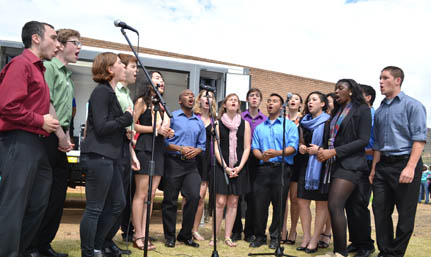Latest News Archive
Please select Category, Year, and then Month to display items
07 January 2018
Photo Charl Devenish
 Dr Anneke van der Spoel van Dijk is invested in contributing
to the global effort of stopping TB by 2035.
Dr Anneke van der Spoel van Dijk is invested in contributing
to the global effort of stopping TB by 2035.
The work of Dr Anneke van der Spoel van Dijk investigates the spread of TB in the Free State population using techniques such as next generation sequencing, spoligotyping and MIRU-VNTR typing. Dr Van der Spoel van Dijk, a senior medical scientist in the Department of Medical Microbiology at the University of the Free State (UFS) also looks at drug resistance in her research. This work informs decisions about how best to treat patients with multidrug-resistant TB (MDR-TB).
She employs rapid molecular techniques to track one of Africa’s most serious diseases, tuberculosis (TB).
Drug resistance
Scientists assist the National Health Laboratory Service and Department of Health in trying to refine the diagnostic tools to identify these cases earlier. Dr Van der Spoel van Dijk explains: “Until recently, it took up to two years to fine-tune treatment decisions for patients with MDR-TB. Patients get a cocktail of anti-TB drugs, but it takes time to find the right combination. Re-infection and relapse (patients stopping treatment for several reasons) add to the diagnostic and treatment management challenges.
Enormous impact
“Now doctors can reduce the time needed for diagnostic certainty to about seven days, while new drugs allow reduction of treatment from more than 18 to nine months. This can have an enormous impact on the life of many patients.”
Dr Van der Spoel van Dijk’s work forms part of research in the faculty looking at resistance development in TB strains. She is currently also doing her doctoral thesis on the differences and incidence of MDR-TB among adolescents versus adults. Dr Van der Spoel van Dijk says: “It is a complicated picture, but we hope to unravel it to support better diagnostic tools and patient care.”
As part of the National Health Laboratory Service, her department is playing an important role in TB diagnostics and the training of scientists and future pathologists. “Our work is contributing to the global vision to stop TB by 2035,” Dr Van der Spoel van Dijk says.
Stanford University Talisman group blows Qwaqwa Campus away
2013-03-28
|
 |
|
'Angelic'. That is how some students described Talisman's rendition of well-known South African hymns and classics.
Photo: Thabo Kessah
28 March 2013 |
The UFS Qwaqwa Gospel Choir hosted a concert and shared the stage with the Stanford Talisman, a unique group of students from Stanford University in the USA, who sing a wide repertoire of genres, which include indigenous South African songs. According to their website, ‘Talisman was created to explore and perform substantive, cultural music’ and this is some of the music they brought to the Qwaqwa Campus.
“This unique pre-Easter concert brought all of us together through music which knows no boundaries,” said Sipho Mnyakeni, who heads Residence Life on the Qwaqwa Campus.
The Stanford Talisman choir left crowds in awe and disbelief with their rendition of indigenous Sesotho, IsiZulu and IsiXhosa hymns. Some of the songs were well-known classics composed and previously performed by the likes of Hugh Masekela and the late Miriam Makeba. One song that blew the audience away, was the well-known South African struggle song 'Asimbonanga' by Johnny Glegg, which was a tribute to the then incarcerated Nelson Mandela.
The groups were supported by Hlanganani, an IsiZulu traditional music student ensemble, and the poet, Black Butterfly.